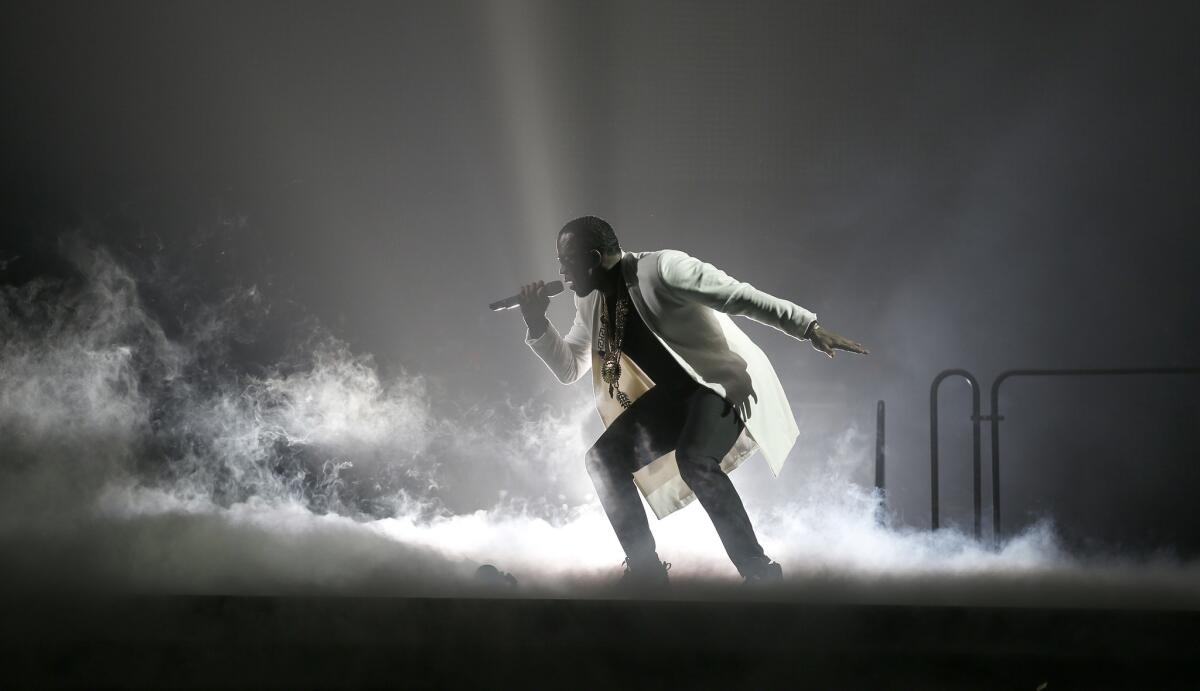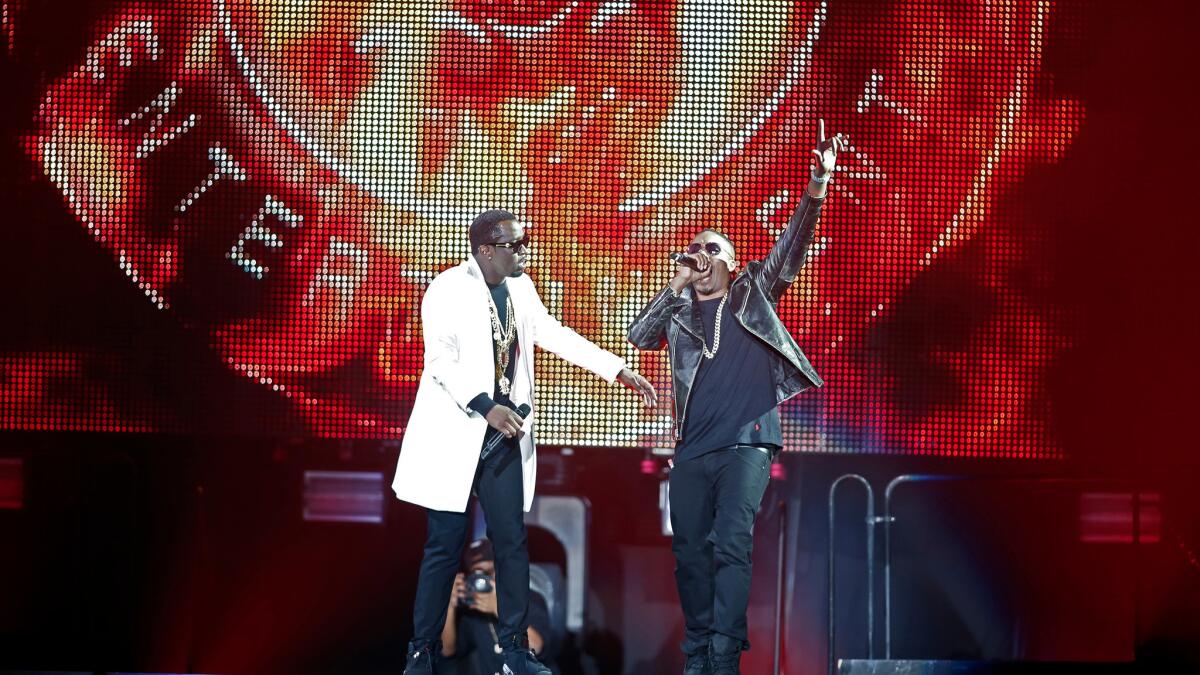‘You ever seen history?’: Puff Daddy brings Bad Boy — and some famous friends — to the Forum

- Share via
For Sean Combs, the only gesture worth making is a grand one.
In the late 1990s, the rapper, producer and record mogul best known as Puff Daddy was perhaps the most visible force of expansion in hip-hop, pushing the once-scrappy form to lavish extremes with songs (and videos) that borrowed the language of pop to glorify a proud but knowing ambition.
“I call all the shots, rip all the spots,” he rapped in “Mo Money Mo Problems,” his exuberant collaboration with the late Notorious B.I.G. and Mase, “Rock all the rocks, cop all the drops / I know you thinkin’ now, when all the ballin’ stops?”
So when Combs, now 46, brought his all-star Bad Boy Family Reunion tour to the Forum on Tuesday night, he wasn’t just celebrating the New York record label he founded more than 20 years ago (although he and Bad Boy acts such as Lil’ Kim and the Lox did plenty of that in typically extravagant fashion).
Combs also used the three-hour concert — the final date of the Bad Boy road show — to make sweeping proclamations on larger themes.
The most important came late in the night, when he brought out Dr. Dre and Snoop Dogg, two icons of West Coast rap, for a mini-performance meant to demonstrate how fully those involved have shaken off the East Coast-West Coast rivalry that once roiled hip-hop.
Following spirited renditions of “The Next Episode” and “Still D.R.E.,” a large video screen at the rear of the stage flashed two Vibe magazine covers: one featuring Snoop and Dre along with Death Row Records founder Suge Knight and Tupac Shakur (the latter was shot to death in 1996), the other with Combs and the Notorious B.I.G. (whose slaying the next year was considered by many an act of retaliation).
To bring these survivors together onstage — in Los Angeles, no less — had real “importance for hip-hop,” said Combs, visibly moved, and he was right.
He was no less effusive during an unannounced appearance by Mary J. Blige, the hugely influential R&B star whose blend of soul vocals and hip-hop beats Combs helped shape in his pre-Bad Boy days as an A&R executive at Uptown Records.
“You ever seen history?” he asked the crowd before bringing out Blige, who delivered her breakout hit “Real Love” with all the streetwise yearning for which she’s adored. Then Combs told her, “You never signed to Bad Boy, but you’re the reason we had Bad Boy,” and embraced her tightly.
Additional surprise guests included DMX, whose growling theatrics felt in the ’90s like a goth-tinged inverse of the shiny Bad Boy aesthetic; Nas, who provided some stormy energy of his own in the aggrieved Puff Daddy duet “Hate Me Now”; and the veteran R&B boy band Jodeci, another signifier of Combs’ early Uptown era.

The Bad Boy years were showcased in back-to-back sets by the Lox, 112, Total, Carl Thomas and Faith Evans, each a fast-moving reminder of how many songs Combs drove up the charts at a time when record sales funded the type of over-the-top lifestyle the label embodied.
For “Can’t Nobody Hold Me Down,” built over a drowsily hypnotic sample of Grandmaster Flash’s foundational rap track “The Message,” Mase ambled onstage wearing a knee-length white-fur coat. And during “Been Around the World” he and Combs happily re-created the flashy dance moves they made famous in their music videos, which defined hip-hop’s visual style at the time.
Lil’ Kim offered some of the same razzle-dazzle with her blond curls and sparkly leotard, though her rapping in “Get Money” had a snarling intensity that made even DMX look like a softie.
The show ended with two personal moments Combs transformed into high-level show business.
First, he introduced two of his sons, Justin and Christian, the latter of whom he said had designs on being a rapper. Yet rather than simply giving over the stage to his child, Combs launched into a fatherly address on the need for truth in hip-hop, gesticulating so fervently that he ended up ripping his pants. (Then he let the kid do his thing.)
And for the final set piece Combs brought out most of the evening’s performers — as well as a choir with singers dressed in robes — for a full-throated rendition of “I’ll Be Missing You,” his smash 1997 tribute to B.I.G.
Anyone who’s followed pop music over the last two decades has heard this song countless times, so many that the pain at its core has likely faded into mere nostalgia for a distant age. Here, though, the emotion of the music seemed alive.
Combs was remembering — and, as always, performing. But he was feeling too.
Twitter: @mikaelwood
ALSO
Citing depression and suicidal thoughts, rapper Kid Cudi checks himself into rehab
The Chainsmokers are getting comfortable with being the biggest pop stars in America
Solange’s triumphant ‘A Seat at the Table’ provides an ambitious meditation on black life
More to Read
The biggest entertainment stories
Get our big stories about Hollywood, film, television, music, arts, culture and more right in your inbox as soon as they publish.
You may occasionally receive promotional content from the Los Angeles Times.











